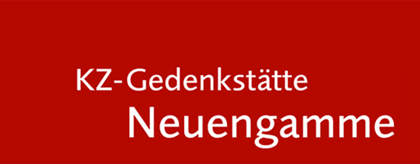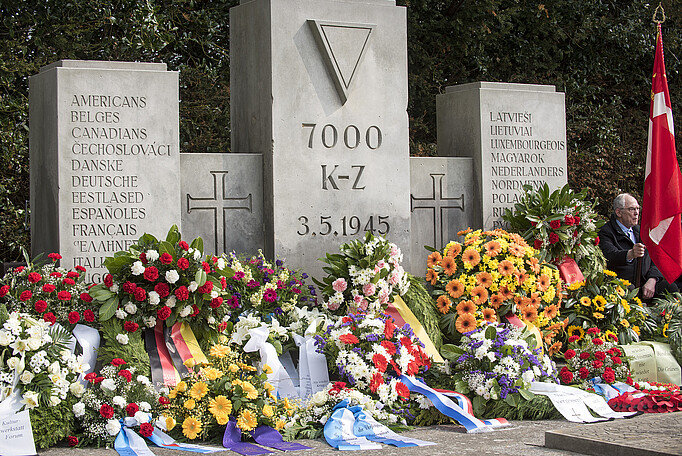05/05/2023 Commemorative ceremony, Report
78th Anniversary of the Liberation
Multiple events were held in the presence of many guests at the Neuengamme Concentration Camp Memorial from 2 to 5 May 2023.
Remembering the bombing of the prisoner ships at Neustadt
On 2 May 2023 the Amicale Internationale KZ Neuengamme and the town of Neustadt in Holstein organised various events in Neustadt to commemorate the 78th anniversary of the bombing of the prisoner ships. This year’s theme was about how to keep the memories alive for future generations, so there were talks with relatives of survivors and events about the importance of children’s books relating to the time of the Second World War. The remembrance ceremony was also organised by schoolchildren commemorating the Polish prisoner Kazimierz Wajsen, whose granddaughter they had met as part of a school project.
Speeches in Neustadt
danish german english french dutch polish russian spanish ukrainian
The Space to Remember, Connect and Support.
Family members present their posters.
On May 2, family members at the Space to Remember, Connect and Support of the Neuengamme Concentration Camp Memorial were able to print the posters that they themselves had designed in memory of former prisoners of Neuengamme Concentration Camp. The printing techniques included those used at the time during the resistance against National Socialism. The Space to Remember, Connect and Support is an active international memorial site that has been expanding since 2020; it was created by and for the relatives of former prisoners of Neuengamme Concentration Camp. At the presentation that followed in the former clinker works, Riet Schuit (together with Karin van Steeg) talked about her father Hendrikus Schipper, who died on 11 November 1944 at the Neuengamme satellite camp Ladelund; she herself never got to know him. As an illegitimate child, her life was difficult, and it was only at the age of 12 that she first learned about her father’s story. But her fight to be recognised as a relative lasted beyond that. On her poster she wrote:
‘No “surviving dependant”. Never named, never mentioned anywhere. And then, 70 years later, there it is, in black and white. Of Drikus’s relationship with Martha van Galen a daughter was born on 27 May 1945. I EXIST AND AM ALLOWED TO BE!’
Janina Martynova and Mykola Titov, relatives from Ukraine, also spoke about their relatives at the event attended by more than 130 participants. Two of Mykola Titov’s uncles were taken to Germany and assigned to forced labour in 1942; one was sent to Neuengamme Concentration Camp following an escape attempt. Janina Martynova’s grandfather was also a prisoner at Neuengamme Concentration Camp. In their speeches both relatives made clear how much the current war of aggression against Ukraine affects the way their own family history is addressed. Finally, more than 40 relatives of prisoners of Neuengamme Concentration Camp read out the names of persecuted family members. The ceremony came to a close with the 31 new posters put up on site.
Speeches at the Space to Remember, Connect and Support
german english french dutch spanish ukrainian
Commemoration ceremony at the former Walther factory on May 3
Around 290 guests took part in the commemoration ceremony at the former Walther factory marking the 78th anniversary of the liberation of Neuengamme Concentration Camp prisoners and the end of the war. Five survivors made the journey to attend the event: Livia Fraenkel, Dita Kraus, Elisabeth Masur-Kischinowski, Natan Grossmann and Barbara Piotrowska, who also gave a speech. She spoke about the Warsaw Uprising and her memories of her father, who died at Neuengamme Concentration Camp. Balbina Rebollar, President of the Spanish Amical de Neuengamme, highlighted the group of Spanish prisoners who had long been overlooked. Several hundred had been imprisoned at Neuengamme Concentration Camp. Hamburg’s Mayor Peter Tschentscher, the State Minister for Culture and Media Claudia Roth and Foundation Chairman Oliver von Wrochem welcomed the 290 or so guests.
The wreath-laying ceremony was then held at the Neuengamme Concentration Camp arrest bunker. The City of Hamburg was represented by the Senator for Culture and Media Carsten Brosda. Many other associations of prisoners and relatives, federal state representatives, civil society associations and groups took part in the commemoration and laid a wreath. As was the case last year, too, consular representatives of Russia and Belarus had not been invited to the commemoration ceremony due to the ongoing war. However, wreaths were also laid for the concentration camp victims from those countries.
Speeches at the May 3 commemoration
german english french dutch polish spanish ukrainian
Talks with contemporary witnesses
Many school classes had come to the memorial site on the morning of May 4 to take part in talks with the contemporary witnesses Dita Kraus, Barbara Piotrowska and Natan Grossmann, who shared their memories of the Nazi era and the persecution. Dita (Edith) Kraus was born in 1929 and now lives in Netanya in Israel. Persecuted as a Jew, she was taken to the Theresienstadt Ghetto, then sent to Auschwitz Concentration Camp and then deported to three satellite camps of the Neuengamme Concentration Camp and the Bergen-Belsen Concentration Camp. Barbara Piotrowska experienced the Warsaw Uprising with her family as a young girl. All were arrested, and her father was deported to Neuengamme Concentration Camp, where he was murdered. She herself was sent to Ravensbrück Concentration Camp, along with her mother. She now lives in Warsaw. Natan Grossmann was born in Poland and persecuted as a Jew. He and his family were sent to the Lodz/Litzmannstadt Ghetto, then to Auschwitz Concentration Camp and the Neuengamme satellite camp at Braunschweig-Vechelde. His parents and his brother were murdered in Lodz and in Chelmo respectively. He survived and now lives in Munich.
In the evening, a discussion with contemporary witnesses Livia Fraenkel and Elisabeth Masur-Kischinowski entitled ‘Fighting Against Oblivion. Two Holocaust Survivors Remember and Look Ahead’ took place at the Freie Akademie der Künste Hamburg. In front of 270 guests, the two witnesses spoke of their survival and life thereafter. Livia Fraenkel was persecuted as a Jew and deported to Auschwitz; she was later assigned to forced labour at the three satellite camps of Neuengamme Concentration Camp. Elisabeth Masur-Kischinowski, born in Czechoslovakia, was also initially sent to Auschwitz Concentration Camp before being deported to three different satellite camps of Neuengamme Concentration Camp. The two women became acquainted in Stockholm in 1946, where they still live today.
On several project days, young people from northern Germany prepared and elaborated the concept for an Erzählcafe with survivors. Some 40 guests came to the memorial on May 5 to attend and listen to the conversations in small groups made up of the young people and the survivors.
New memorial at the Memorial Grove
May 4 saw the official inauguration of the memorial for Spanish resistance fighters and members of the International Brigades in the presence of relatives of former victims of persecution at Neuengamme Concentration Camp. The design by sculptor and relative Serge Castillo is dedicated to ‘all victims of the Spanish Civil War, “Red Spaniards” and members of the International Brigades who heroically endured the barbarity of the Nazi regime at Neuengamme Concentration Camp’. It represents a further expansion of the Memorial Grove at the site. In addition to the Spanish Amical de Neuengamme, the event was also attended by representatives of the Spanish government and the Minister of State of the Principality of Asturias.
Speeches at the inaugaration
Reports in german TV
RTL (starting min 2.50)
NDR (starting min 9.30)













